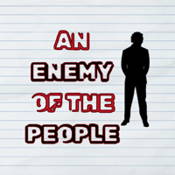Monologue Overview
Show
Character
Gender
Male
Playing Age
Adult, Mature Adult
Style
Dramatic
Act/Scene
Act Four
Time & Place
Norway, Captain Horster’s house, 1880s
Length
Long
Time Period
Classical
Show Type
Play
Age Guidance
Youth (Y)/General Audiences (G)
More Monologues
Context
Dr. Stockmann has upset many significant people
to read the context for this monologue from En Folkefiende and to unlock other amazing theatre resources!Text
I propose to raise a revolution against the lie that the majority has the monopoly of the truth. What sort of truths are they that the majority usually supports? They are truths that are of such advanced age that they are beginning to break up.
to read the full text for this monologue from En Folkefiende and to unlock other amazing theatre resources!Videos
Related Learning Modules
All monologues are the property and copyright of their owners.
Monologues are presented on StageAgent for educational purposes only.
Auditions and jobs
near {{headerProps.location}}
Upcoming performances
Getting events near by you...
